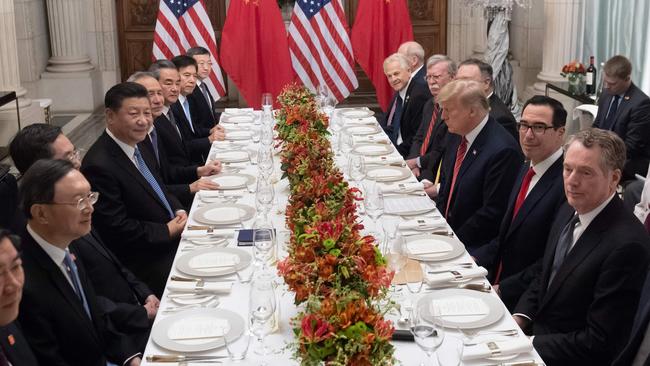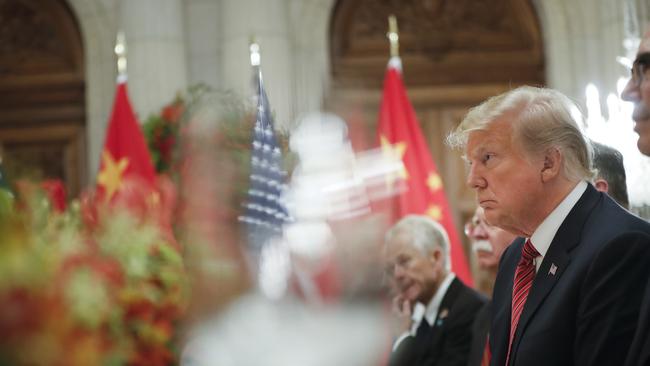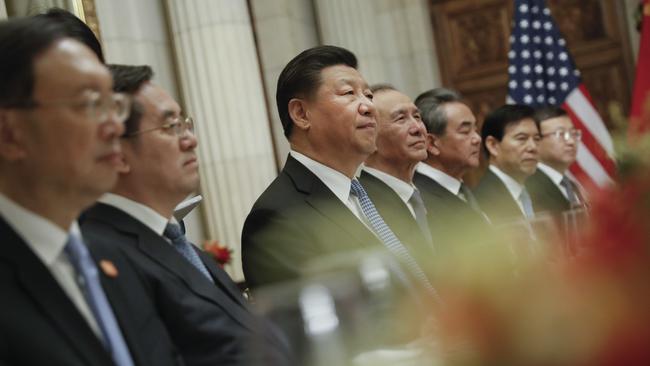G20: US, China reach trade tariff truce after Trump-Xi dinner
Donald Trump and Xi Jinping agree to a ceasefire in their $500 billion trade war after dining together on the sidelines of G20.

Donald Trump and Xi Jinping have agreed to a trade war ceasefire amid fears that the feud between the US and China was threatening to spiral out of control and wipe out half a trillion dollars of economic growth for the rest of the world.
The cooling of tensions between the two superpowers at the close of the G20 summit was last night being heralded as a breakthrough flowing from the G20, as the US President and his Chinese counterpart agreed to de-escalate trade hostilities.
The two leaders agreed to pause any escalation of their trade war for at least 90 days to allow negotiations on new trading rules between the countries, including commitments by China on intellectual property protection and forced technology transfer, and an agreement by Beijing to purchase a “substantial” amount of agricultural, energy and industrial exports from the US.
However, Mr Trump warned that all bets would be off if the nations could not reach a lasting agreement that tipped the balance towards a more favourable position for US businesses.
Scott Morrison told The Australian on the flight from Buenos Aires last night that the meeting between Mr Trump and Mr Xi had “exceeded expectations”, with clear acknowledgment of crucial issues.

“I’m pleased to see optimism rewarded with the progress achieved between President Xi and Trump at their meeting in Argentina,” the Prime Minister said. “That said, there is still much work to do. We’re now getting down to the business end, which represents real progress from where we were several months ago.”
Mr Morrison said the most significant breakthrough for Australia was an agreement with European Commission president Jean-Claude Juncker to “accelerate” negotiations on a historic Australia-EU free-trade agreement, which could be finalised before the federal election, opening up a $17 trillion market.
Mr Morrison said Mr Trump and Mr Xi had listened to the concerns of the world’s major economies, including Australia, about the need to de-escalate tensions. “Our task has always been to attempt to bring the temperature down,” he said.
The meeting between the leaders of the world’s biggest economic powers had overshadowed the G20. A statement released by the White House confirmed both men had enjoyed a “highly successful” discussion over sirloin steak.
Mr Morrison had pressed the point with Mr Trump during a private meeting on the sidelines of the summit that the hostilities posed a very real risk to the global economy.
The statement by the White House confirmed Mr Trump had agreed to not raise trade penalties further as planned, which would have affected another $US200 billion in Chinese imports on top of the $US260bn in tariffs already imposed. China, which has so far slapped $US130bn in tariffs on US goods in retaliation, in turn also agreed to a new “structure” to deal with cyber intrusion and intellectual property theft following accusations by Mr Trump that China was stealing state secrets.
“On trade, President Trump has agreed that on January 1, 2019, he will leave the tariffs on $US200bn worth of product at the 10 per cent rate, and not raise it to 25 per cent at this time,” the White House said.
“China will agree to purchase a not-yet-agreed-upon but very substantial amount of agricultural, energy, industrial, and other product from the US to reduce the trade imbalance between our two countries. President Trump and President Xi have agreed to immediately begin negotiations on structural changes with respect to forced technology transfer, intellectual property protection, non-tariff barriers, cyber intrusions and cyber theft, services and agriculture.

“Both parties agree that they will endeavour to have this transaction completed within the next 90 days. If at the end of this period of time the parties are unable to reach an agreement, the 10 per cent tariffs will be raised to 25 per cent.”
Mr Trump said: “This was an amazing and productive meeting with unlimited possibilities for both the United States and China.
“It is my great honour to be working with President Xi.”
Chinese media quoted Foreign Minister Wang Yi as saying an “important consensus” had been reached between the two countries. “Both countries agreed to open their markets further and China agreed to address the legitimate concerns of US businesses,” he said.
The International Monetary Fund had warned that US-China tensions posed a “systemic” risk to Australia if they were allowed to develop into a full-blown trade war. The IMF expected Australia’s economy would expand by 2.8 per cent next year, down from 3.2 per cent this year.
Australian Industry Group chief executive Innes Willox said the truce was the first step towards ending the trade war that had placed a handbrake on global growth and constrained Australian exports. The Export Council of Australia’s head of trade policy, Heath Baker, said the cooling of trade tensions was “a very good sign”, but big trading nations such as Australia were “not out of danger yet”.
The Australian understands former treasurer and now envoy to Washington Joe Hockey was instrumental in securing a formal meeting between Mr Morrison and Mr Trump on the first day of the G20.
Additional Reporting: Ben Packham



